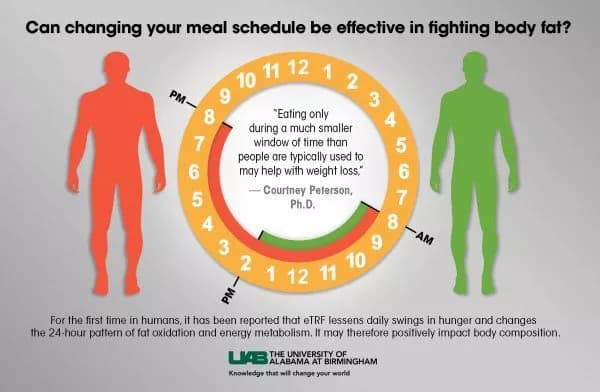
Time-Restricted Feeding Study Shows Promise In Helping People Shed Body Fat
University of Alabama at Birmingham researchers are trying to find out whether changing a person's eating schedule can help them lose weight and burn fat.
The first human test of early time-restricted feeding, or eTRF, found that this meal-timing strategy reduced swings in hunger and altered fat and carbohydrate burning patterns, which may help with losing weight. With eTRF, people eat their last meal by the mid-afternoon and do not eat again until breakfast the next morning. The findings were unveiled during a presentation at The Obesity Society Annual Meeting at Obesity Week 2016 in New Orleans, Louisiana.
"Eating only during a much smaller window of time than people are typically used to may help with weight loss," said Courtney Peterson, Ph.D., an associate professor in the Department of Nutrition Sciences at UAB. "We found that eating between 8 a.m. and 2 p.m. followed by an 18-hour daily fast kept appetite levels more even throughout the day, in comparison to eating between 8 a.m. and 8 p.m., which is what the average American does."
This new research, funded by a TOS Early Career Research Grant awarded in 2014, suggests that eating a very early dinner, or even skipping dinner, may have some benefits for losing weight, although further studies need to take place to confirm that theory. Previous animal studies showed that eTRF helped rodents burn more fat.
The human body has an internal clock, and many aspects of metabolism are at their optimal functioning in the morning. Therefore, eating in alignment with the body's circadian clock by eating earlier in the day may positively influence health. This first test of eTRF in humans follows rodent studies of this approach to weight loss, which previously found that eTRF reduced body fat and decreased the risk of chronic diseases in rodents.
During the human study, Peterson and her colleagues followed 11 men and women with excess weight over four days of eating between 8 a.m. and 2 p.m., and four days of eating between 8 a.m. and 8 p.m. Researchers then tested the impact of eTRF on calories burned, fat burned and appetite. Participants tried both eating schedules, ate the same number of calories both times and completed all testing under supervision.
Researchers found that, although eTRF did not affect how many total calories participants burned, it reduced daily hunger swings and increased fat burning during several hours at night. It also improved metabolic flexibility, which is the body's ability to switch between burning carbs and burning fats.
Whether eTRF helps with long-term weight loss or improves other aspects of health is still unknown. Peterson says that, because the human study involved only a small number of participants, a larger, more comprehensive study will need to take place.
Materials provided by University of Alabama at Birmingham. Note: Content may be edited for style and length.
Disclaimer: DoveMed is not responsible for the accuracy of the adapted version of news releases posted to DoveMed by contributing universities and institutions.
Related Articles
Test Your Knowledge
Asked by users
Related Centers
Related Specialties
Related Physicians
Related Procedures
Related Resources
Join DoveHubs
and connect with fellow professionals

0 Comments
Please log in to post a comment.